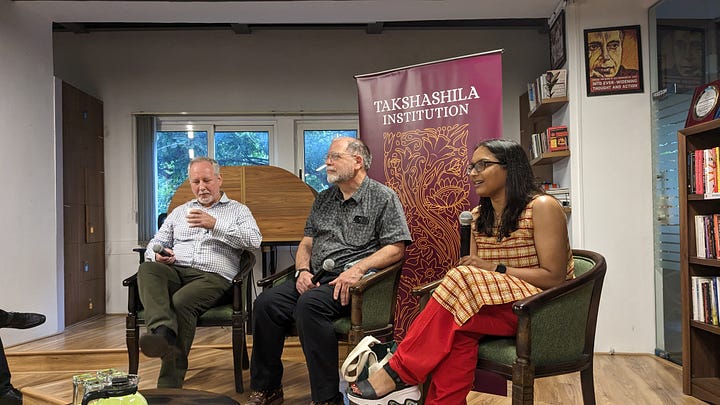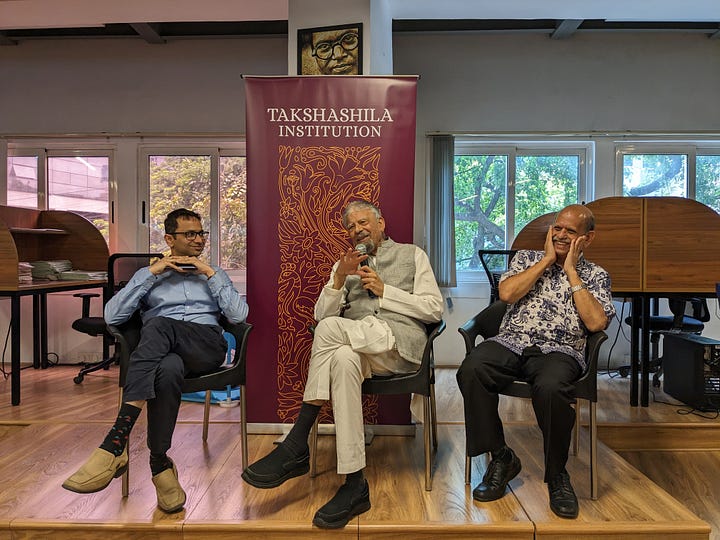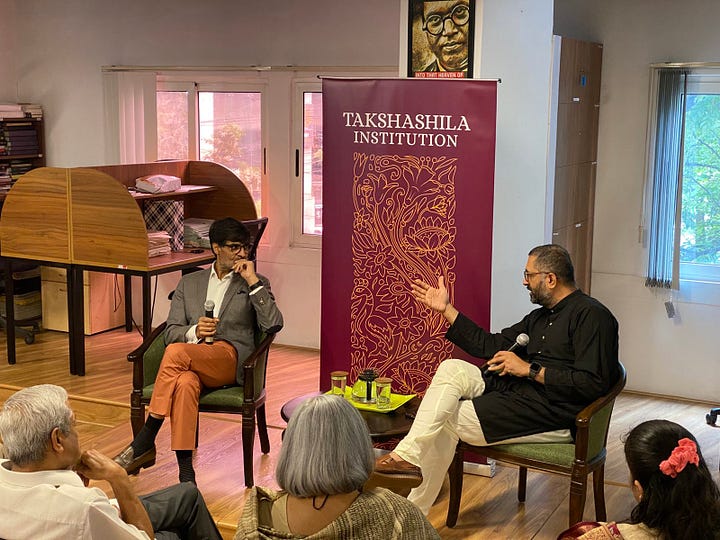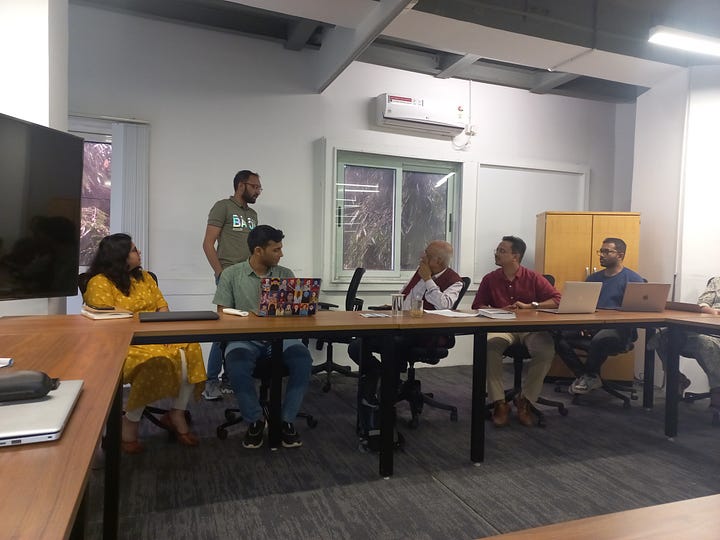Newsletter Launch | The Quad Bulletin
Chip War, Social Security for Gig Workers, China's New Criminal Law & More
How to collaborate on a Quad newsletter
Way back in 2007, the then-Japanese Prime Minister Shinzo Abe initiated a security dialogue with India, Australia, and the United States, backed by a massive Exercise Malabar, which was restricted to only the US and India until then.
The four-way dialogue, referred to as the Quadrilateral Security Dialogue or simply the Quad, is easily one of the most consequential strategic partnerships of this era, and has grown in importance for India – first under Prime Minister Manmohan Singh and later, under Prime Minister Narendra Modi.
It is in this context that Takshashila research analyst Bharat Sharma’s new newsletter on the Quad assumes importance. As he puts it
“There is a growing interest in the Indo-Pacific region... The past few years have seen an increase in the number of minilateral and multilateral groupings in the region. The Quad Bulletin is our effort to track the developments of one such grouping — the Quadilateral Security Dialogue, and use insights from those developments to understand the larger Indo-Pacific region.”
His noting of the announcement of the India-Japan semiconductor partnership is especially important. The far-east Asian nation has a strategic interest in collaborating with India on an issue that is already at the front and centre of various countries’ foreign policies.
Coming on the heels of Prime Minister Modi’s back-to-back state visits to Washington and Paris, where high-tech geopolitics took center stage, the Japan declaration is of immense importance.
If you wish to collaborate with Bharat on this newsletter, write to him at bharat.sharma@takshashila.org.in.
The US will remain the master of the chip domain. Here’s why
Takshashila’s chair of the High Tech Geopolitics Programme, Pranay Kotasthane, and Takshashila’s Indo-Pacific Programme research analyst Amit Kumar have written a thorough analysis of why the United States, despite China’s emerging dominance in the semiconductor sector, will prevail in the so-called “chip war”.
In his Op-Ed for Hindustan Times, Pranay and Amit feel that the Chinese restrictions on the export of Gallium and Germanium – two elements that are critical for scores of high-tech applications – may not have much of an impact on existing American dominance. The Americans are far ahead on all three parameters of substitutability, supply chain prowess, and acquired capability/technological gap.
They write:
“If anything, Beijing’s actions reveal how narrow its options are in a US-China tech war. The fact that China chose to impose controls on upstream elements rather than knowledge products shows that it has a weak hand in high-tech. For now, it’s advantage Washington.”
You can also bookmark Takshashila’s continuing commentary on semiconductors here.
The law of unintended consequences
Back home, Rajasthan became the first state in India to introduce a law that aims to provide social security to gig workers. As Takshashila’s professor of economics, Anupam Manur points out,
“The need for some form of social security measures for gig workers was so acutely felt that this Act is currently lauded with messianic zeal just for the good intentions behind the law. There is a good chance that other states will follow suit and therefore, a closer scrutiny can instruct areas for improvement.”
But is the law going to deliver exactly what it promises? Anupam is not too sure. He explains his POV in this column for MoneyControl.
You can read NITI Aayog’s report on India’s gig workers here, and for a deeper reading of what the Rajasthan law entails, you can head to this link.
Anupam followed up his written analysis on a podcast episode with Shrikrishna Upadhyaya, via Takshashila’s immensely popular ‘All Things Policy’ series.
Why do we need radical ideas for scientific publications
Our colleague and head of research Shambhavi Naik has an excellent opinion piece in The Hindu on the accessibility of scientific research. There’s a problem, Houston, and as Shambhavi explains:
“One important drawback of the extant publishing model worldwide is that it extracts a steep cost for this value addition – in the form of substantial subscription fees or substantial article processing charges (APCs). These models impose a considerable disadvantage on those operating with smaller research budgets, by limiting their ability to publish in ‘good’ journals and to access new research.”
She feels,
“It may be wiser to create new alternatives to publishing houses themselves rather than determine how to fund more open-access publishing within the existing system. For this to happen, science societies and academies could cooperate for a novel way to evaluate scientific work.”
China’s criminal law amendments… yes, they are important
Takshashila’s young brigade has been on a roll recently. Anushka Saxena’s superbly crafted op-ed on China's criminal law amendments is an example. The country’s draft amendments propose to include private sector enterprises under the ambit of the Criminal Law’s anti-bribery and anti-corruption provisions.
Now, why are they important? Anushka explains:
“If promulgated, the amended Criminal Law will provide a two-pronged impetus to Xi’s ambitious anti-graft campaign and increasing regulatory interventionism in the private sector. It may also be complemented by a “blacklist” system for businesspeople convicted of the crimes of bribery and/or corruption, a system the Central Commission for Discipline Inspection (CCDI) announced in 2021. It was implemented in Hunan province, where 106 “untrustworthy” personnel from six companies were put on a blacklist for giving bribes, and their market access was restricted. These numbers may see a surge across provinces with the force of the amended law behind them.”
In the din that is China, this is one thing that missed most people’s radar. Not Anushka’s.
Nitin Pai’s podcast episode is only an hour long
By now, Takshashila director Nitin Pai is a veteran of podcasts. His latest appearance was on Story Rules, where he had more than an hour-long discussion with Ravishankar Iyer. Just to be sure, a one-hour podcast episode is kind of short for Nitin, who appeared on a five-plus-hour podcast episode of The Seen and The Unseen by Amit Varma.
In this episode with Ravishankar, Nitin delves into several issues concerning public policy. But instead of belabouring the points here, you can head over to Story Rules, and listen to an exhilarating discussion between the host and the guest here.
Takshashila plays host to policy giants (no, not our own)
Tyler Cowen, Alex Tabarrok, Shruti Rajagopalan, Ambassador V Seshadri, Dr. Vijay Kelkar, Dr. Govinda Rao, and Samir Saran were hosted at the Takshashila office last week. To say our week was action-packed is an understatement. Don’t take our word for it, just look at the pictures!




A Twitter (oops, X) thread on the T20 Final Summit
Shambhavi Naik, our Head of Research, makes her second appearance in this episode of Dispatch, with this Twitter thread (we will still call it Twitter for the time being).
She wrote:
“As the T20 final summit begins, thank @T20org @orfonline for the opportunity to co-chair the track on SDGs. The past 8 months have been enriching and humbling. Enriching to learn so many ideas for the public good. Humbling that the idea of public good is itself so diverse.
The thread also notes how Takshashila’s researchers contributed as many as seven policy briefs across diverse topics — climate change insurance, health security, pandemic preparedness, space data sharing, supply chains, and malnutrition to the T20 data bank.
Applications for the September 2023 Cohort of GCPP are Now Open


That’s all from us this week. Take care!
P.S. From this week onwards, we are piloting a revamped Takshashila Dispatch. Do write to us at publications@takshashila.org.in with your feedback on the new version - tell us what you liked and what you would like to see differently!



